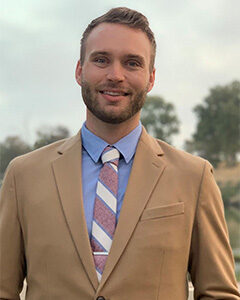Baritone Dr. Tyler Reece serves as Associate Dean of Enrollment and Student Life and teaches on the Vocal Studies faculty at the Longy School of Music of Bard College.
At home on the recital stage, Reece has performed Lieder staples such as Winterreise, An die ferne Geliebte, Dichterliebe, and—notably—Frauenliebe und Leben. Using the latter as a case study in his doctoral dissertation, Liebe und Leben: Exploring Gender Roles and Sexuality in Nineteenth-Century Lieder, Reece focused on the intersection of gender, sexual identity, and the evolution of performance practices in classical vocal music. By portraying the Frauenliebe protagonist as a gay male in the twenty-first century, he gave a much-needed modern makeover to Schumann’s antiquated and often maligned cycle.
In Fall 2023, Reece partnered with fellow Longy faculty member, Wayman Chin, to present Whither Must I Wander?, a program featuring side-by-side performances of songs by Englishman Ralph Vaughan Williams and American Charles Ives bookended by Schubert selections. The program was hailed as “one of the most interesting and well-conceived programs in Boston”. Reece’s “silvery tenorial range charmed ears with a passionate tone that soared gloriously over the piano” (Boston Musical Intelligencer). Other recital engagements include the Lompoc Music Association, Santa Barbara Music Club, The Master’s University, Opera San Luis Obispo, Opera at Oakhurst, and the Aspen Music Festival and School.
Reece is no stranger to the operatic stage. In his role debut as Count Almaviva in Le nozze di Figaro (2018), Reece was described as bringing “comedic skill and solid singing to his role” (BravoCalifornia!). He has also performed roles such as Guglielmo in Così fan tutte (2012), John Styx in Orpheus in the Underworld (2013), Marco in Gianni Schicchi (2014), Papageno in Die Zauberflöte (2015), the title role of Thomas Pasatieri’s Signor Deluso (2017), and Harold von Reckenburg in the North American premiere of Franz Léhar’s Die Juxheirat (2019). In a tribute to American composer Joel Feigin, Reece sang the role of Malvolio in Feigin’s operatic setting of Shakespeare’s Twelfth Night (2015). As a concert soloist, he has performed portions of Handel’s Messiah with the Santa Ynez Valley Chorale, Vaughan Williams’ Fantasia on Christmas Carols with the Santa Barbara Choral Society and Orchestra, Leonard Bernstein’s Somewhere with the Santa Barbara Symphony, and premiered a new edition of Monteverdi’s Vespers of 1610 with the University of North Texas Collegium Singers.
Dr. Reece is also the winner of numerous awards through the National Association for Teachers of Singing (NATS) for his interpretation and performance of art song. In 2018, he won first place in the Cal-Western Region of NATSAA (National Association for Teachers of Singing Artist Awards). In 2015, he was the winner of the Gwendolyn Roberts Young Artist of the Year Award for the NATS-LA chapter, through which he was awarded a full fellowship to attend SongFest in Los Angeles. Additionally, he has won prizes from the Santa Barbara Performing Arts Scholarship Foundation and California Women’s Chorus Scholarship Foundation.
Originally from Aspen, Colorado, Tyler Reece graduated with his Bachelor of Arts from Luther College, then went on to earn his Master of Music and Doctorate of Musical Arts from the University of California, Santa Barbara (UCSB) on a full fellowship with a teaching assistantship. His principal teachers and mentors include Linda Di Fiore, David Judisch, Isabel Bayrakdarian, Allen Hightower, Jerry McCoy, and Richard Sparks. In his role as teaching assistant, Reece taught a full studio of undergraduate singers and conducted the UCSB Women’s Chorus. In 2019, he was awarded the Excellence in Teaching award from the Graduate Student Association for his work with the Women’s Chorus, which grew from 13 to nearly 40 singers under his leadership.
Teaching Philosophy
My intent as a teacher is to provide informed guidance and unending support as my students work to build their vocal technique, self-confidence, and individual artistic aesthetic.
Invisible to the naked eye, the human voice is a complicated and complex instrument to teach. I strive to develop a language unique to each of my students; one that is founded on sensation and informed by pedagogy. For me, teaching is about learning what my students experience and crafting exercises that build off of what they know to be true. I believe my students are wholly capable of directing themselves in the practice room and on stage. My job is to focus their intention and give them the tools to be autonomous singers.
From a technical perspective, my teaching is founded on the Bel Canto principle of appoggio (“support”). Building on this foundation, my goal is to establish laryngeal stability, release unnecessary tension in the articulators, and help each student find their true, uninhibited sound. Building one’s technique as a singer is essential, but I view myself as more of a teacher/coach. Diction, language, dramatic portrayal, and collaboration are topics commonly addressed in the studio, as they are equally important on stage.
Wherever they are on their journey, I want my singers to feel supported and driven when they leave their lessons. Technique should never impede self-confidence. It’s important to remember why we sing: to tell stories, share emotions, and make connections with our audiences.

